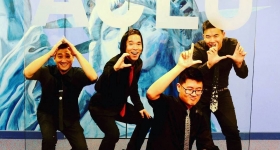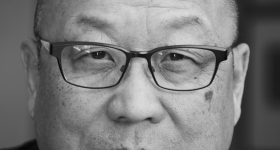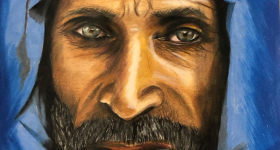"Queer Check-Ins," curated by Franny Choi, poses the question, “Are You OK?,” to 12 queer Asian and Pacific Islander diasporic poets. Their responses are captivating, beautiful and unsettling at times. Each poet reads their piece and shares a glimpse into their life through video and imagery. Hyphen interviewed Franny Choi, a former Hyphen editor, about her work on the exhibition.
Curatorial Note
It's a strange time to be strange. For those of us who are queer and trans, femme and gender non-conforming, immigrant and indigenous, every day seems to bring a new understanding of the exact precariousness of our survival. As artists, we are often making our visions for the future while being drained by loss, heartbroken by loneliness and the distances between us. But, as poet Ocean Vuong writes, "loneliness is still time spent / with the world." As curator for this project, I'm excited to gather these 12 queer voices from across the Asian and Pacific diasporas to form a kind of collective rest stop in our travels through this America. Together, these poets meet the dark road ahead with fierce tenderness, with legends and incantations, with sharp criticism and complex dreams. Here are 12 check-ins from our extended chosen family; twelve brief glimpses into what it looks like when we stay.
- Franny Choi
What was the ask for the writers?
We sort of left it open-ended and gave them a few different options. I think the guiding principle was "show us your life." Show us a day in your life. But also, we said it could be something really mundane or it could not. I didn’t exactly want to limit it to “show us your most boring/average day" because I think it was important to be able to include the fantasy of one’s life or a pivotal moment in one’s life. For example, Paul Tran’s video is them walking through this gorgeous field in a gown and it’s not exactly an average day, maybe. But it’s a moment where they’re taking intense control over their image, and I think that’s just as powerful as someone going grocery shopping or putting gas in their car.
Can you describe why you feel these pieces are so powerful and so important?
I think that it’s bizarre how powerful it is to see queer Asian and Pacific American people simply existing. I think particularly because, for poetry, so often what we’re trying to do is elevate the mundane in some way — take something small and ordinary and connect it to the larger, fantastical, philosophical terrifying question that we encounter in our interior lives. And so, I think that the ideas are, to me, so powerful because they marry both of those. They marry both the mundane fact of existence above our continued survival overlaid with really powerful, incredibly formidable, talented voices. We get to see clearly how incredible it is that we are continuing to make lives in this world that is so bent on our destruction.
Can you comment at all on the importance of having queer Asian writers in particular carry these stories?
The stories of queer and trans-Asian Pacific Americans are important and relevant to more than just the people who share those identities. The things and experiences that we are experts in are relevant to the questions of what it means to be American, what it means to be a person living in a climate change and capitalism-fueled apocalypse, what it means to be searching for home and trying to make home where you are. Queer Asian Americans and those who have both the experiences of displacement, whether through migration or through the genocide and colonization of indigenous people, understand or have kind of emotional expertise in what it means to be far away from home. And queer and trans folks are experts in many ways in recreating homes after or in the wake of structures that didn’t want to call us into their families and into their circles. And so, I think the combination of those two experiences, being displaced across nations and geography and also being displaced within one’s own body and gender identity — I think all of that culminates in lessons of the heart that are important to lots of people and that a lot of people can find wisdom and solace in.
The question of what wisdom can Asian American voices give to the larger kind of swath of LGBTQ narratives is a legitimate question and also sometimes a hard one for me to personally answer.
What do you hope viewers take away from these pieces? And to go back to your title in a sense, of “Are you OK?,” how would you comment on how these pieces responded to and reflected that question?
I guess if people take away anything, I would like for them to take away the idea that maybe their knowledge of what a queer Asian Pacific American writer is or what they look like or how they speak — that that idea might be challenged in some way or expanded. And I think that for anybody who shares in either identity or experience or both, I hope that they feel a little less lonely by watching these videos.
I think one thing that was beautiful about peoples’ responses was how many different directions folks went with it and in how many ways the writers involved sometimes didn’t really seem to respond to the question at all. And I think that’s beautiful and great. "Are you OK?" is a yes or no question, and yes or no questions are terrible and they do terrible things for poems. So, I think that was why it was particularly exciting for me to have poets answering that question. Because all poets are kind of allergic to simple questions. And I think that’s the best possible thing, to try to say something honest is to really avoid saying yes or no. And I think also something that’s very real and that I appreciate is that for a lot of poets, the answer is no. I’m not doing OK. And I think it’s important to represent the truth of that as well, that it is really hard. That some days are bleak, and also that sometimes we’re on our way home like in Hieu’s video. Or also that we’re trying to reclaim something powerful in ourselves like in Paul’s video. For all of those things to be part of our larger response to "Are you OK?" is very comforting and inspiring for me.
Nine videos are now available on the Smithsonian Asian Pacific American Center’s website.
To view the videos and learn more about "Queer Check-Ins," visit https://smithsonianapa.org/queer-check-ins/. The final three videos will be available to view this summer.
Queer Elders, a series of short films by Mia Nakano
Another component of the exhibition is entitled "Queer Elders", which consists of four films by Mia Nakano, who was Hyphen's first photo editor, documenting the experiences of four APA elders who get the chance to share their past experiences and to remark on what the future holds. The first installment features Lenore Chinn, who has spent her life in the San Francisco Bay Area. The final three installments will capture stories from Los Angeles, the South and the Midwest, but are not yet available for viewing. Hyphen sat down with Mia to ask her a few questions about her project.
Why did you decide to take this project on?
I really wanted to start looking into the past and connect the fact that queer APIs have been a part of all these different social justice and civil rights movements. It made sense when I started talking to the Smithsonian about doing a project because that’s where my heart was.
There are so many people in the community whose work has not been seen or highlighted, and there’s this direct correlation between what they are fighting for now and what they were fighting for before.
This year is the 50th anniversary of Stonewall. And the trans women of color have essentially been erased from that history. The elders I’ve interviewed and worked with are more active and connected than I am, but they’re just doing it in different ways. They are advocating on so many different levels, and they have the experience and knowledge to do so much.
Did you have anything specific in mind when choosing the locations for your subjects?
Through my experiences, it’s really the South and Midwest that get overlooked so much, and I think it’s really important for people to understand and know that there are really strong queer API communities in these areas.
I want people to know and understand that and understand the nuances and distinctions. Also specifically looking for folks who identify along the gender spectrum, so I didn’t want it all to be cis women. I want as much nuance to be represented in these four stories.
What do you feel you’ve learned from the experience of putting together these shorts?
I feel like the interviews I’ve done are the stories I wish I had heard or been exposed to when I was much younger, in high school and college. They are a reflection of myself and also a reflection of the different layers that have gone into so many different communities. I want people to see and feel that and realize they’re getting a 40- to 50-year history condensed down into six or seven minutes. These folks have done so much that didn’t make the cut, and I think people really empathize and connect with stories in a special way when you hear someone’s voice and their story and are then able to actually see the photos and their stories.
So, I want people to be inspired by that, to be inspired to share their stories and also know that as we get older, there are always experiences to share and things to learn.
To view the videos and learn more about "Queer Elders," visit https://smithsonianapa.org/queer-elders/.
To learn more about the Smithsonian Asian Pacific American Center’s digital exhibition, "A Day in the Queer Life of Asian Pacific America," visit http://smithsonianapa.org/day-queer-life/.










Comments